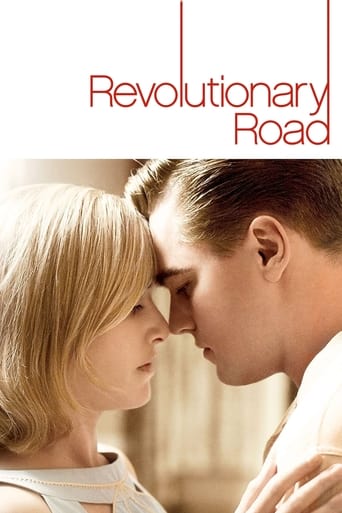cinephile-27690
"Titanic" stars Kate Winslet and Leonardo DiCaprio(and even Kathy Bates) reunite for for this movie, which many people call "Titanic" if Jack had lived.
However, Jack and Rose are now Frank and April, and they want to live a new life, in Paris to be particular. However, they have affairs which makes the marriage complicated. '
Frank commits adultery, and confesses it to April, and she has no reaction due to an event early in the movie. Frank, in better terms says "So you don't care who I have sex with?" After the movie I told Grandma that April took that really well. Grandma said "I wouldn't take it well!"
I personally like this better than "Titanic". The main reason for that is there isn't a subplot like the "necklace" in RR.
I can't say much else, but you should know I gave this my highest rating and so did Roger Ebert. That should show how good it is!
lovaszi-peter
An outstanding drama demonstrating an awfully common problem of our society, which often isn't being recognised by the suffering party.
The drama has 3 main characters - April (Kate Winslet) the housewife, Frank (Leonardo DiCaprio), the main character and will talk about the third one later.If you experience anything what you've seen in the movie, you are psychologically abused and should see someone specialised immediately.
Frank personalises the perfect abusive husband who knows all the trick how he can terrorise April without ever hurting her physically. But she doesn't give up, tries to change their life entirely, Frank gives the hope, agrees with April, but when he has to do action, he finds excuses every time. And again and again so he can let April down.
Well, this is not the first one of its subject. The third main character is John (Michael Shannon), who says out loudly the truth and is intelligent enough to analyse the main characters psychologically - ironically he is considered psychopath for doing it so in this 1950's society.Overall it is a good movie representing important values, but not an easy watch. You might get confused about April's personality and behaviour, which demonstrates how much she suffers due to the abuse she has to take.
ElMaruecan82
If you don't know it from experience, you know from movies that marriage isn't all it's cracked up to be. I used to fill the ranks of optimists who saw it as a whitewater rafting with a few rapids to ride when it's closer to drifting across an ocean of routine, punctuated by loud hurtful arguments and a few tender 'sorry' or 'I love you' to conceal the wounds. Films are never as haunting as when they reflect the turbulence of your own life. And watching Sam Mendes' "Revolutionary Road" was like a slap from my mirror.Leonardo Di Caprio and Kate Winslet are Frank and April Wheeler, young, loving and good-looking. They share everything: car, bed, house, lawns and kids to play in, but in their lucid moments, they realize their solitude. In a spectacularly directed scene, a wave of men with gray flannel suits are literally spreading over New York streets, The Knox building exudes some Billy Wilder's Apartment" vibes while the crowd shots gives the film a surrealistic touch, channeling the famous Magritte painting with the men with bowler hats. Frank is like a lemming caught in a crowd and about to accomplish his daily suicide over the cliff, he sits down in his cubicle and can only gets his kicks by acting like a 'big shot' in front of an easily impressionable secretary.April can breathe fresh air every day, but with the fathers at work and kids at school, suburbs look like ghost towns, a feeling of total emptiness is inevitable and ends up invading April. Frank is a face in a crowd who doesn't have time, April has time and space but she's tied to Frank. Both are married but terribly alone. Now, loneliness can be a door for as many rooms as opportunities, but in marriage, the door is locked and you're trapped in one room: marital, existential dead-end.April dreamed to be an actress but in the 50's, Hollywood was like TV, many called and few chosen. The film opens with a flop that draw the curtain on her dreams and after many attempts to consulate her, Frank finally lets this out and invites her to abandon this 'theatre' nonsense.The couple buys a nice suburban house in "Revolutionary Road", their real estate agent, played by Kathy Bates who, have found the perfect house for the perfect postcard-couple. But we know what that facade of happiness can hide the ugliest realities. Sam Mendes made the great "American Beauty", a social commentary about the suburban American life, made of ersatz of contentment and where families could only lead carbon-copy lives dictated by consumerism and pretending to have a 'normal' life because they're too afraid to question the norm. But we're no fools, we see these men and women talking about kids, eating, sleeping or having sex but they're only making an effort to hide their disillusions.In "Revolutionary Road", the roles are reversed, it is April, who suggests Frank to abandon everything and go to Paris, she'll find a job in the Embassy and he'll have time to figure out what he wants to do. Frank is tempted… to a certain degree: he knows he has no talent, the only certitude is that he hates his job, that meaningless job he can't even explain in proper words, that sucked the life out of his father, making him swear to himself he'd never fall in the same death trap. But as a coach told me once, we're sometimes better than we think at things we hate, and Karma plays quite a trick on him by giving him a raise and a promotion. Frank is like a Lester Burnham in terms of awareness but not in the action and this is where "Revolutionary Road" stands out among the other marriage movies, this is one about inaction rather than action.Indeed, it is about a wife who wants to go to Paris without a plan, and a man who can't because he's scared, they know what they hate and they share the same hatred, but there's a crucial difference: April won't go to Paris to be happy, she'll be happy if she goes to Paris, Frank anticipates and thinks the remedy is worse than the disease, he can't see that his wife gave him a tacit ultimatum, she reached the existential dead-end before him. It is very appropriate that the only person in the movie to tell the truth and to make sense is an insane man played by Michael Shannon. He can see the gateway to escape from the inconvenient truth, and sweeps off Frank's justification with a cruel verdict: "you deserve each other".They know he's right but can't admit, and that's the terrible truth of marriage: it forces you to keep silent. The ending left me puzzled what's with that old man listening while his wife was babbling, but then I realized it wasn't random; the point was that many marriages looked exactly the same, forcing people to pretend to live happy. In the 50's, the American family model was the norm but looking at the way people smoked and drank and had affairs with their secretaries or neighbors, you realize that not much have changed, today, it's porn and Internet. The cures changed not the symptoms."Revolutionary Road" is more relevant than ever, it speaks devastating truths about bored office workers and desperate housewives, and as someone who actually followed his wife to a 'Paris' scenario, let me tell you that it didn't work either, I'm still figuring out what I'm made for and life is still routinely. So I can say that April and Frank were doomed from the start, and the tragedy is that they certainly loved each other.I had just seen "Romeo and Juliet" recently (and the remake with Leo) and the more marriage movies I watch, the more I wonder if it the play had such a tragic ending after all.







